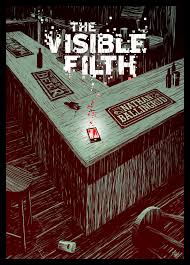 Eric wouldn’t let go of the guy’s neck. He hit him again a few more times, and when the bottle came around once more he took it on the cheek. Blood sprayed onto the floor, the pool table, across his own face. Eric made a high-pitched noised that seemed to signal a transition into another state of being, that seemed to carve this moment from the rational world and hold it separate. It seemed that another presence had entered the room, something invisible, some blood-streaked thing crawling into the light.
Eric wouldn’t let go of the guy’s neck. He hit him again a few more times, and when the bottle came around once more he took it on the cheek. Blood sprayed onto the floor, the pool table, across his own face. Eric made a high-pitched noised that seemed to signal a transition into another state of being, that seemed to carve this moment from the rational world and hold it separate. It seemed that another presence had entered the room, something invisible, some blood-streaked thing crawling into the light.
Will is a bartender at Rosie’s, an all-night venue in one of the New Orleans’s less fashionable districts. Working the late shift he sees all kinds of things, not all of them pleasant, but Will doesn’t mind. He’s used to breaking up fights, clearing up the mess afterwards. His job means he can hang loose, live easy. There are always plenty of women around, and he has his best mate, Alicia, to share the ups and downs. Everything’s cool. Except it’s not. The cockroaches seem to be multiplying in Rosie’s Bar – Will imagines them swirling up from their nests in the pit of hell – and when the latest late-night fight gets out of hand, one piece of debris Will takes home with him does not prove so easy to get rid of as he first imagined. Suddenly, Will has bigger problems on his mind than how to decide between his current girlfriend Carrie and his not-so-platonic friend Alicia.
It was interesting reading this right after Scott Nicolay’s debut collection Ana Kai Tangata (review to follow soon). On the face of it, Will seems closely related to Nicolay’s protagonists: disaffected, shiftless, a total tool in his attitude to women. There are differences, though – Will does have glimmerings of self-awareness, but mainly it’s in the way Ballingrud is prepared to show, through his writing, that both Carrie and Alicia have their own agenda, their own agency, and that their biggest problem, actually, is Will. Fair dos to Will himself in finally realising this:
A terrible weight suspended between his lungs, threatening to upend him. He felt the heat of shame and grief gather in his face. It wasn’t supposed to go like this. He made his way to the bedroom and excavated a crumpled duffel bag from the recesses of the closet. He began to shove clothes into it, heedless of what he might actually need. Just random things. When he walked to the bathroom to get his toothbrush and his razor, he heard a stifled sob in the kitchen.
This was the world he’d built. This was his kingdom.
The apotheosis of bad breakups for Will, then. And somehow I don’t think it’s going to matter all that much, what he puts in that duffel bag…
The story itself – a neat little twist on the contamination-by-video scenario firmly cemented in the horror genre by the first Ring movie – is compelling and doom-laden and finally horrific enough to keep you interested. No, scratch that – there’s no way you’re going to put this This is Horror chapbook down once you’ve started reading it. There’s a roughness around the edges, in parts – by the time Ballingrud’s writing has fully gathered momentum in the second half, the thing’s almost done. This story isn’t as finely wrought as Nicolay’s finest – Ballingrud’s language is very, very good in parts, but an overall consistency seems lacking. On the whole, I think ‘The Visible Filth’ would actually have benefited from being double the length, or even longer. I want to know more about the book Carrie was researching. I do definitely want to know more about whose phone that was. There’s so much more here that Ballingrud could have chosen to explore. I understand the argument for not revealing everything – but in this case it seems a damn shame not to have given this story its head, to have allowed it to become the novella it so clearly wanted to be.
Solid effort, though. Solid and enjoyable and menacing. That last page or two – why did you go there, Will? Why? (Yeah, he was a dork, but I did kind of feel sorry for him in the end.)